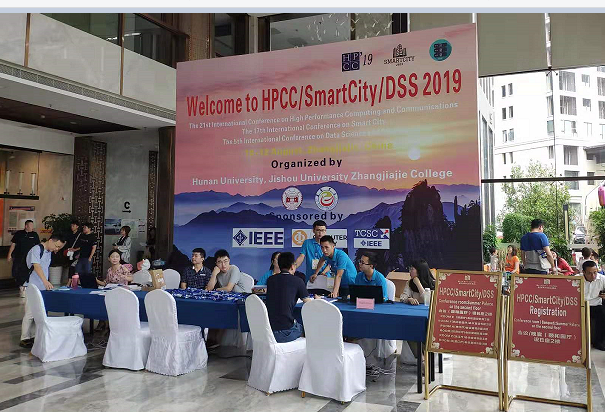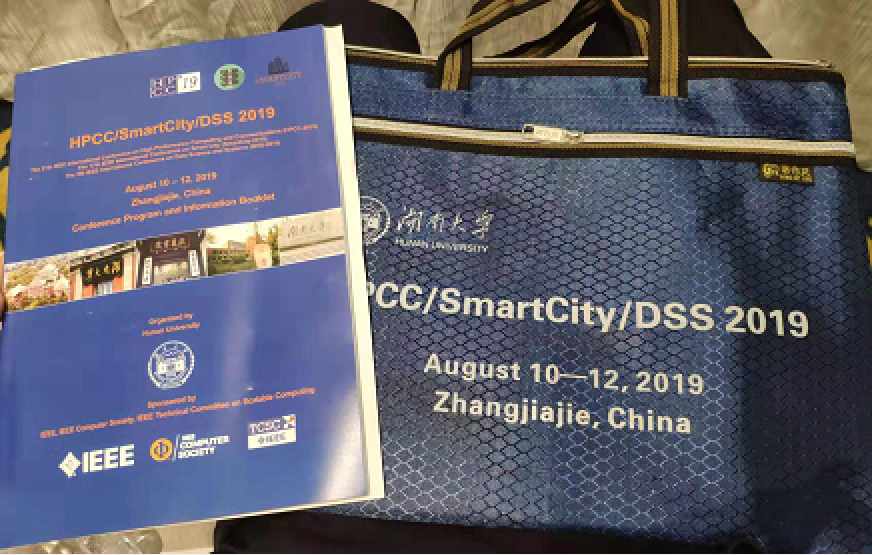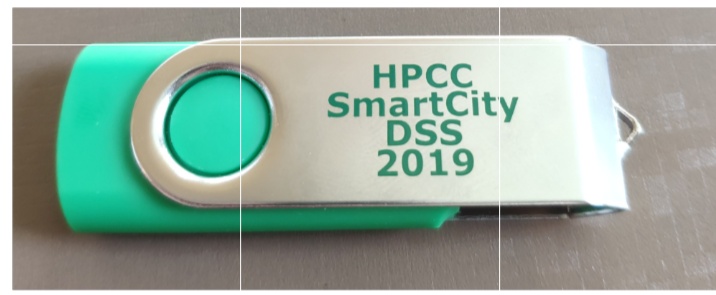In this blog post, I will write a short report about the HPCC 2019 conference (21st IEEE Conferences on High Performance Computing and Communications).The HPCC 2019 conference was held in Zhangjiajie, China from the 10th to 12nd August. It is colocated with DSS 2019 and SmartCity 2019, and organized by Hunan University.

Registration
I did the on-site registration and I received the conference bag, which contained the conference program, a notebook, a pen, and other information. However, I found that the conference bag did not contained the conference proceedings (neither printed or on a USB drive). So, I checked the website of HPCC which clearly say that:
“each registrant will receive a copy of the conference proceedings.“
Then, I asked the registration desk why I did not receive a copy of the proceedings since it is written on the website. But they did not wanted to give me one. I am not sure what is the reason for that and they did not explain but just said that there is no proceedings. My guess is that it is because I paid the regular registration free (about 550$) rather than the author registration fee. But still, the website said that ALL registrants would receive the proceedings. After talking with the registration desk, they only offered to copy it to my computer from their USB drive… which is not convenient, and it should not be that way. It should be provided in the bag, or in the worst case, it should be downloadable from the website.
One hour later, after talking with other participants, I found that some of them had received the proceedings on a USB… Thus, while attending the keynotes I sent an e-mail to organizers to ask why I did not receive the proceedings. After about one hour, they apologized and asked me to go back to the registration desk (for the third time) to give me a proceedings on USB. They did not give me a clear explanation but by listening to them talking in Chinese, it seems that they did not have enough proceedings so some people did not receive it. But there might also have been some misunderstanding.


Keynote by Bart Selman on the future of AI
This speaker said that he is excited about recent developments in AI research, and its increasing applications into the real-world. He mentioned that finally machines are starting to “hear” and “see” after about 50+ year of research on AI. Some recent changes is that big set of labelled data are now used to make AI understand our conceptualization of the world, and that there is a strong commercial interest in AI. The speaker said that by 2030, a 1000$ computer will be as powerful as the human brain in terms of computing power and storage (see picture below). I think that this is a bold claim given that the brain has a very different architecture from a computer. I would be curious about how they come with these numbers that the brain has billions megabytes capacity and billions MIPS.

About the future of AI, he mentionned that the next phase is further integration of perception, planning, inference, and learning. Moreover, we also need depper semantics of natural language such as common sense knowledge and reasoning. Common sense is also needed to handle extreme or unforeseen case (for example, to ensure the safety of self-driving cars). Moreover, the speaker mentioned that non human intelligence may be developped. Overall the talk was interesting.
Other keynotes
There was also several other keynotes by some good speakers, including Prof. Witold Pedrycz, editor of Information Science and other journals. And there was a keynote by Yunhao Liu about the internet of things, and a talk by Xindong Wu among others. I will not describe all of the keynotes since some of them are not so much related to my research (e.g. keynote on sensor networks).
One keynote speaker had several videos but could not play them due to some technical problem. The talk was still very interesting, but it is a reminder that one should always do a test on the equipment before giving a talk especially when using videos.
Paper presentation
I came to the conference because I am co-author of the following paper (which was presented by the first author):
Win, K. N., Chen, J., Xiao, G., Chen, Y., Fournier-Viger (2019) A Parallel Crime Activity Clustering Algorithm based on Apache Spark Cloud Computing Platform. Proc. of 21st IEEE Conferences on High Performance Computing and Communications (HPCC-2019). to appear.
This paper is about analyzing criminal activity data to discover interesting patterns (fuzzy clusters). The proposed algorithm is implemented on Apache Spark.
Conclusion
This was a brief report about the HPCC 2019 conference. It is a medium-sized conference (I would guess about 400 persons including the two colocated conferences), with many parallel sessions. The highlight of the conference was for me the keynotes, which were given by some good researchers. The conference proceedings is published by IEEE and included in the EI index, which is interesting. The location of the conference in Zhangjiajie, China was also great. There is a nice national park.
—
Philippe Fournier-Viger is a full professor working in China and founder of the SPMF open source data mining software.




